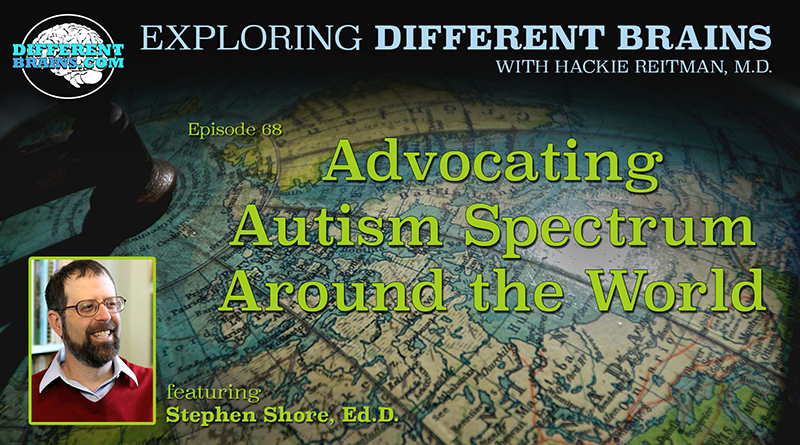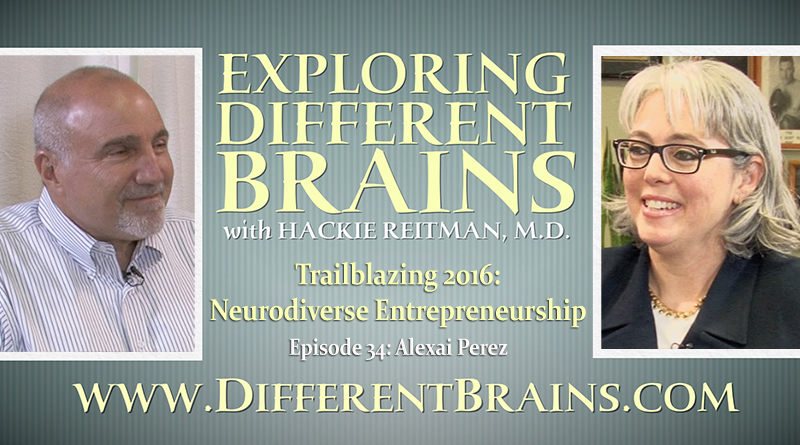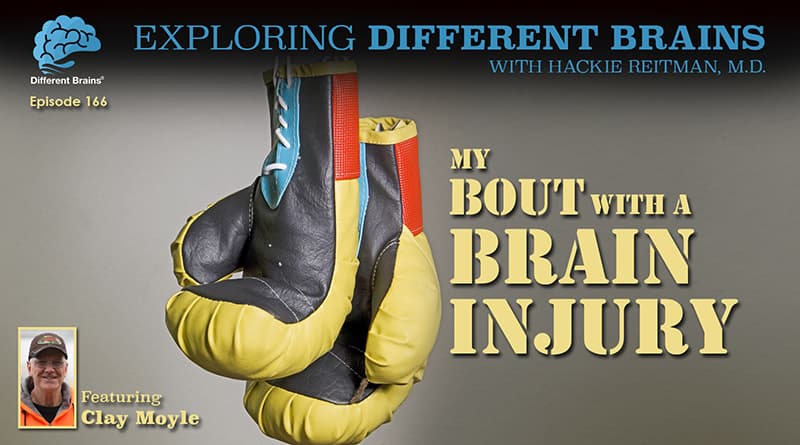
Advocating Autism Spectrum Around the World, with Stephen Shore | EDB 68
In this episode, Hackie Reitman, M.D. welcomes back return guest Dr. Stephen Shore- author, autism advocate, board member for Autism Speaks, and professor at Adelphi University. You may recall Dr. Shore was diagnosed as non-verbal and autistic at the age of 4, when doctors suggested his parents institutionalize him. Since then he has gone on an amazing journey that has led him to speaking on behalf of autism and neurodiversity in 49 countries and all but one continent. Dr. Shore discusses he recent advocacy work in Taiwan, the commonalities between different conditions, and the importance of employment for the neurodiverse.
Be sure to take a look at Dr. Shore’s first Exploring Different Brains episode by clicking here.
For more information about the work of Stephen Shore, please visit his website www.AutismAsperger.net
Or check out his channel: youtube.com/user/tumbalaika
For more on Adelphi, visit: www.adelphi.edu
71 Second Preview:
To listen or download the audio-only, podcast version of this episode, see the embedded player below.
Or look for us on your favorite podcast provider:
iTunes | Stitcher | SoundCloud
[expand title=”Click Here to View Full Transcript”]
HACKIE REITMAN, M.D. (HR): Hi I’m Dr. Hackie Reitman, welcome to another episode of Exploring Different Brains. Today we have a returning All-star, one of the Different Brains All-stars. Professor Stephen Shore of Adelphi University who does so much for so many. He’s on every continent around; I think he just returned from Taiwan, which I thought was an island last time I checked. Stephen Shore, welcome back to Different Brains!
STEPHEN SHORE, ED.D. (SS): Well it’s great to be back, and you’re right I just got back from Taiwan. I just got back a few days ago and it’s still an island or at least it was when I left. So it probably still is.
HR: Now how many continents have you been on?
SS: 6, there is only 1 left.
HR: Which one is that?
SS: It’s the one way at the bottom. Antarctica.
HR: Oh nice. What was the biggest thing you noticed during your Taiwan trip? I know you were teaching, but what did you learn?
SS: The biggest thing I learned was that there is a great desire in people to learn more about Autism. And that’s a good thing. And the challenges I find is that there are very few resources in Taiwan. I actually did my workshop for a school that is part of an International consortium of English speaking international schools. There is about 100 of them in this consortium and this group is the special ed component you might say. It was really like presenting in the United States because everyone spoke English. They understood the laws that surround special education, they knew what an IEP was, so it’s not really not a representative view of what really is going on in Taiwan for the natives.
HR: In your travels, which countries would you say are way up here on “doing the right thing, or doing their best” and which countries might you say have the farthest way to go?
SS: Well looking at it that way, what I found is that places such as Australia and England, New Zealand, these are places that I’ve been to and I’ve seen really good work being done there, there are other locations such as India and Russia where they have now become aware of what Autism is. So they have the awareness piece but what I find really encouraging is though there is challenges in terms of developing greater awareness and education for Autistic people, they’re reaching out to people in other countries that have a longer experience, such as in the United States, such as I. So for example in the United States, we’ve had about 50 years of practice and I emphasize the word practice, in special education. The other countries as being members of the UN and signing onto the UN convention for the rights for people with disabilities, which also include education. They’ve developed some very nice looked special education laws that seem pretty similar to what we have in the United States and in some cases they’re even better. But the real challenge they face is the implementation.
HR: I just came from a board meeting of the wonderful people of the Boys and Girls Clubs of Broward County here in Fort Lauderdale where we serve 12,000 wonderful youth, and today the CEO Brian Quail presented a work skills model that we’re gonna be the first one in the whole United States doing, that have pathways to certificates and real employment for these 12,000 at risk youth. Now to my knowledge, the boys and girls clubs does not have a program for “neurodiversity” nor have I been able to find a lot in the literature about the inner city youth. Now I’m sure that a large percentage of our at risk youth, if they were asseted and if a project were done would come up with different labels like all of us do. ADHD, Autism Spectrum, OCD, ADHD you name it. What I’m looking to be able to articulate to the Boys and Girls Club is to say look, you see what we’re trying to do here at DifferentBrains.com you see what a guy like Stephen Shore is doing going all over the world to spread the awareness and give people tools and give people pathways to employment and so forth, what can we do to bring that awareness nationally to the Boys and Girls club of America from right here in fort Lauderdale to the Boys and Girls clubs of Broward county?
SS: Alright well you’ve got the advantage of location, you’re not too far away from them and what it means is bringing information and materials about Autism and perhaps having somebody on the Autism Spectrum meet the management and the directors of the organization. That way they can get an idea of what Autism may look like and also what the potential of Autistic people is.
HR: Ok so that would be something where we call upon a world leader such as yourself and say Stephen come on down here, visit Hackie in Fort Lauderdale, and teach us how to get started on this.
SS: Yeah I could see doing that, I think that would be a good idea whether it’s me, I’d love to to it, or if you get someone else to do it. The key is that it needs to be done.
HR: Ok, very good. Now the last time we spoke was quite awhile ago already, you were recently named to the board of Autism Speaks and since that time I heard it through the grape vine that you have affected big changes in latitude changes in attitude at Autism Speaks all for the positive. Could you enlighten our Different Brains audience on this?
SS: Yeah I certainly can and also I must say these changes are only possible with collaboration of others on the Autism Spectrum such as Valerie Paradiz who is also on the board and also people within Autism Speaks who don’t necessarily have Autism but have come to an understanding that Autism is something to be worked with as opposed to something that you do to. That way Autism Speaks now realizes chasing for a cure is like a dog chasing it’s tail number 1. Number 2 it’s not really a good idea to do anyways; there are some real ethical concerns about seeking a cure and eliminating a certain type of people. Now at the same time some of the people involved at Autism Speaks in particular Suzanne Wright had children or grandchildren who were pretty severely affected with autism and had significant challenges in communication and social interaction maybe there was some severe digestive issues and what not and in these severe cases they were just desperately seeking a way to reduce their children’s suffering.
Now they realize and I include Suzanne Wright, may she rest in peace, that we need to find way of unlocking the ways of people on the Autism Spectrum and I mention Suzanne in particular, while she may have said some inflammatory things, it was towards the end of her life that I attended a breakfast where she spoke and this breakfast was for the wives of various ambassadors and presidents and leaders of other various countries, Autism Speaks hosted a breakfast and during that breakfast she didn’t talk about cure on the Autism spectrum, but she was talking about finding ways for people on the Autism Spectrum to live filling and productive lives as adults. So I found that to be a big change and with the incoming chair of the board who has a young adult on the Autism Spectrum, he is all about supports for his child, well now adult child. Finding ways to enable him lead a filling and productive life and to be happy with what he’s doing. So that’s a big change and that culminated with the change in the mission statement where cure was dropped in favor of life long supports, acceptance of people on the Autism Spectrum, and involvement in adults on the Autism Spectrum within the organization. I found this very very encouraging and we’ll be able to do some really great things.
HR: You used a word in your dissertation just now that resonated very well with me as an MD, a physician. We don’t want anyone to be “suffering”. Ok, we don’t want people to suffer no matter what the cause of the suffering is and that’s a worthy goal also, but it is a mine field to tip toe through there with out somebody getting mad at you.
SS: Yeah, that is so true. There is a lot of strong feelings and there is a lot of you might say parts or constituents of the Autism community and you also brought up a really important point, as a physician reducing suffering which suggests that well it’s important to be positive and focus on the strengths and as you also suggested if we find a way to match those strengths to employment we have the potential for someone to be a regional, national, or international expert on the subject. Now that said, there are also significant challenges that come with Autism, that come with being on the Autism Spectrum and that do need to be addressed and we need to work on those. The way I see the use of intervention whether it be medical, whether it be sensory, whether it be educational or behavioral is that you’re helping that individual live the best life they can as someone who is on the Autism Spectrum.
HR: How do you see things relative to autism as one member of the spectrum of all different types of brains, in other words what I’m seeing as we evolve here at different brains is the lets use different terminology if we take neurological conditions such as Alzheimer’s and stroke and parkinsonism and we take mental health issues such as schizophrenia and bipolar, depression, anxiety, if we take intellectual, developmental differences such as autism, dyslexia, lets throw in down syndrome, all the different types of different brains, I’m probably missing a couple big categories but forgetting labels for a minute, newer studies have shown that all these brains get wired differently and they all have some degree of neuroplasticity and the reason I’m on this campaign to get them all under one roof is to end the stigma of any of this and lets all just work together to help each individual maximize their potential to achieve happiness health, independence, gainful employment and anything else we can think of. Do you see it that way? Or do you see it differently?
SS: That’s the way I see it, I see autism as a different way of being and not necessarily a disordered way of being, we can say the same about the same as many of the other conditions as well. With that being said with autism there are a number of things with autism that can be very disordering whether its extreme sensory issues and you cant bear to remain in your skin and many places are off limits to you because there is just too much sensory overload. Other situations where the person on the autism spectrum has not acquired a reliable means of communications, that’s incredibly disordering, or if you want to go into the medical end of things we have some autistic people who have digestive issues and may need special diet so we do need to address these challenges. As we look at autism another way I look at is, we’re talking about a study of extremes, we may see some extreme challenges but coupled with that there a often corresponding extreme strengths and that’s where you get into the special interests and the special abilities.
I do my work in education often many of the modifications and accommodations we make for students on the autism spectrum are helpful to others as well. As I think about autism, one way to consider autism is that it’s a combination of a number of other conditions. With autism you get differences in attention, as we find ADHD for example. With autism you see challenges in social interaction which you also see in other conditions and sometimes in ADHD as well. Motor control issues which we find in other conditions and I find if an educator does well with teaching and supporting autistic students, then they’ll probably do well with another of other conditions. And also as we think about the modifications and accommodations that we make for our autistic students or if we want to telescope into the future, for those on the spectrum who are in employment situations or in the community they often benefit others as well. Some common examples, I actually named one which is keeping things structured and organized, that helps everybody. Another one is lighting many autistic people view or perceive florescent lights like most people perceive a strobe light. We also know that everybody’s productivity is negatively affected by florescent lights, so if we were to change out the lighting or use natural lighting or incandescent lighting then everybody benefits in the deal. It often reminds me like some hotels that offer special hypoallergenic rooms and they advertise them as having hardwood floors so there isn’t dust from the rugs, they’re cleaned with natural products, all cotton high thread bed linens and so on. My response to that, wouldn’t everybody want such a hotel room? So if we make these modifications everybody benefits.
HR: I was giving a workshop, Stephen, at the broward center of performing arts with a fellow you might know, Jose Velasco with SAP. He’s great, head of one of the global leaders of SAP, the worlds largest software company and when he was talking about his program, we were on a panel together, he said hackie, this is not a social welfare project this is a business transition, this is good for our bottom-line it’s good for our company. That’s another way to look at it how you can harness this to get someone’s ear in corporate America and not to do it to be good but to make more money. Go ahead.
SS: Yeah he’s absolutely right on that, in SAP and Microsoft and various other businesses there are autistic people who are doing work better and faster than the neurotypical population. We can also include the IDF, where I visited during thanksgiving last year. I spent about 36 hours in Israel and a lot of that time was spent meeting with and talking with soldiers in the IDF all who have Asperger’s syndrome and were hired or whatever you call it when you get inducted into an army. They’re working there and are recruited because they have Asperger’s Syndrome and because they have such visual acuity that they can see things that others may struggle to see or maybe not even see at all and they’re expanding that role to other areas as well. So not just visual but other aspects where people on the spectrum may have specific skills and in the educational realm I think about my university, Adelphi University, we have a program like many others have for students with Asperger’s syndrome. I think about 150, we could double that if we had the space for them and through some preliminary research that students engaged in this program number 1 have a higher grade point average than the general student population and then number 2, they’re sticking around longer, they have a better retention rate. So what does that mean? They’re doing better, they’re staying longer, they’re paying more tuition dollars and what that also suggests is that the supports we’re providing with Asperger’s syndrome might we provide them to the rest of the student population so that they can do better and be better supported and stick around longer. So again what’s good for autistic people tends to be good for everybody else.
HR: And what a great Segway to our friend Mitch Nagler of the Bridges to Adelphi program where you are, we had the pleasure to interview Mitch and it was very enlightening and of course he is your number one fan.
SS: Yeah, exactly and I’m his number one fan as well. He’s doing great work and it’s a great program. More and more schools are engaging in supports for autistic students in various ways and is great diversity in the types of supports and just like everything else, it’s a matter of matching your needs to those supports.
HR: Where can people learn more about you?
SS: More information about me can be found at either my website www.autismasperger.net, I can also be found at my channel on YouTube, or at Adelphi university or if you don’t remember any of this stuff just type in my name Stephen Shore plus the word autism or Asperger’s syndrome and a number of links will come up
[/expand]
This video is owned by Different Brains Inc, kindly donated by it’s original producer PCE Media LLC.
Different Brains® Inc. founder Harold “Hackie” Reitman, M.D. is an author, filmmaker, retired orthopedic surgeon, former professional heavyweight boxer, the past chairman and president (and current board member) of The Boys and Girls Clubs of Broward County, and a neurodiversity advocate. However, it was his role as a father that led to the creation of the DifferentBrains.org website.
Hackie’s daughter Rebecca grew up with epilepsy, 23 vascular brains tumors, and underwent 2 brain surgeries before the age of 5. Her struggles and recovery put him on the road to, through 26 professional heavyweight boxing matches, raising money for children’s charities (to which he donated every fight purse).
Rebecca eventually went on to graduate from Georgia Tech with a degree in Discrete Mathematics, and Dr. Reitman wrote and produced a film based on her experiences there (The Square Root of 2, starring Darby Stanchfield of ABC’s Scandal). After graduation, Rebecca received a diagnosis of Asperger’s syndrome. Hackie, shocked at his own ignorance of the topic despite being an M.D., embarked on years of research that culminated with his book Aspertools: The Practical Guide for Understanding and Embracing Asperger’s, Autism Spectrum Disorders, and Neurodiversity (released by HCI books, publishers of the Chicken Soup for the Soul series).
This experience revealed to Hackie the interconnectedness of the conditions that fall under the neurodiversity umbrella, while alerting him to the in-fighting and fractured relations that often plague the organizations tasked with serving the community. Convinced that overcoming these schisms could help all of society, Hackie forged the Different Brains philosophy of inclusive advocacy: “Supporting Neurodiversity – From Autism to Alzheimer’s and All Brains In Between”.
In the company’s initial years of operation, Hackie self-financed all of the content on DifferentBrains.org, all of which offered free to view to the public. Currently he is the host of our weekly interview show Exploring Different Brains, writes blogs for the site, and tours the country speaking at conferences, conventions and private functions, all with the goal of improving the lives of neurodiverse individuals and their families, and maximizing the potential of those with different brains. Separate from Different Brains, Hackie is the founder and CEO of PCE Media, a media production company focusing on reality based content. He recently co-executive produced the documentary “Foreman”, the definitive feature documentary on legendary boxer and pitchman George Foreman.




